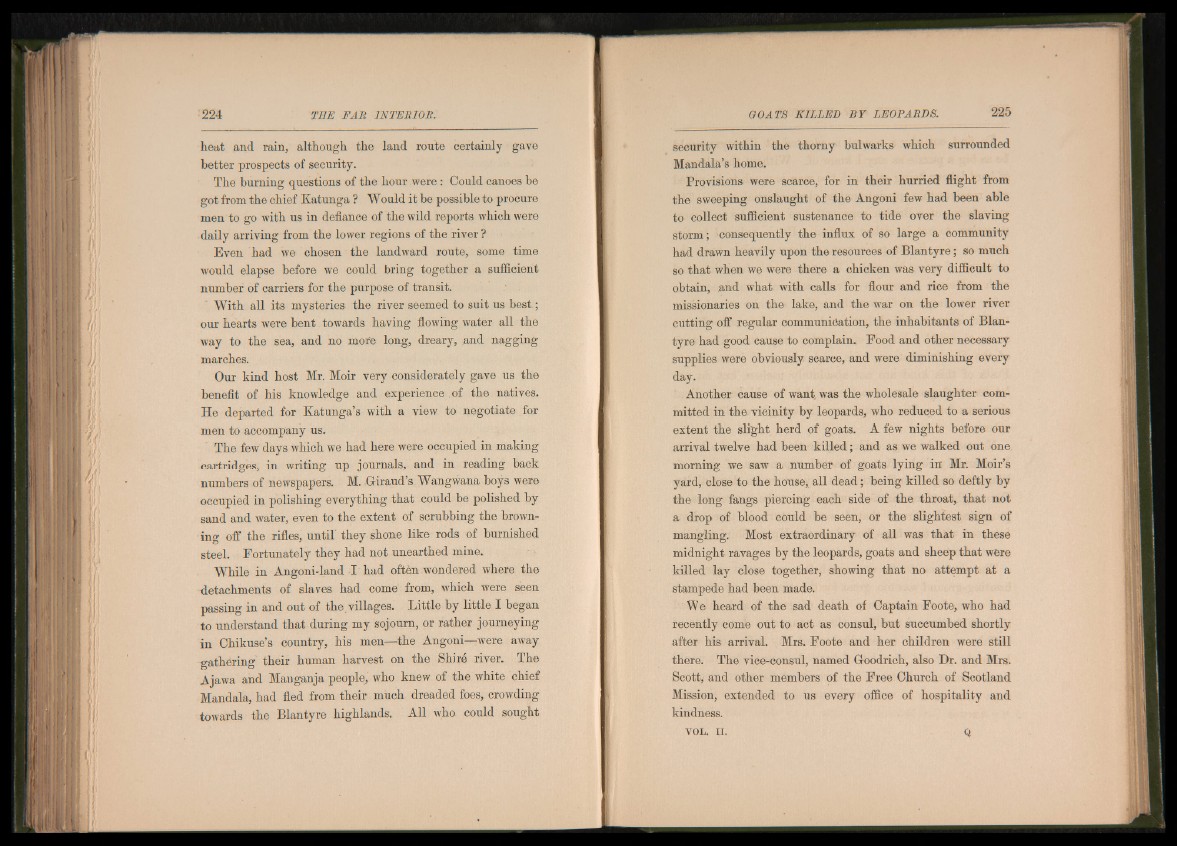
heat and rain, although the land route certainly gave
better prospects of security.
The burning questions of the hour were : Could canoes be
got from the chief Katunga ? Would it be possible to procure
men to go with us in defiance of the wild reports which were
daily arriving from the lower regions of the river?
Even had we chosen the landward route, some time
would elapse before we could bring together a sufficient
number of carriers for the purpose of transit.
With all its mysteries the river seemed to suit us best.;
our hearts were bent towards having flowing water all the
way to the sea, and no more long, dreary, and nagging
marches.
Our kind host Mr. Moir very considerately gave us the
benefit of his knowledge and experience of the natives.
He departed for Katunga’s with a view to negotiate for
men to accompany us.
The few days which we had here were occupied in making
cartridges, in writing up journals, and in reading back
numbers of newspapers. M. Giraud’s Wangwana boys were
occupied in polishing everything that could be polished by
sand and water, even to the extent of scrubbing the browning
off the rifles, until they shone like rods of burnished
steel. Fortunately they had not unearthed mine.
While in Angoni-land I had often wondered where the
detachments of slaves had come from, which were seen
passing in and out of the.villages. Little by little I began
to understand that during my sojourn, or rather journeying
in Chikuse’s country, his men—the Angoni^were away
gathering their human harvest on the Shire river. The
Ajawa and Mauganja people, who knew of the white chief
Mandala, had fled from their much dreaded foes, crowding
towards the Blantyre highlands. All who could sought
security within the thorny bulwarks which surrounded
Mandala’s home.
Provisions were scarce, for in their hurried flight from
the sweeping onslaught of the Angoni few had been able
to collect sufficient sustenance to tide over the slaving
storm; consequently the influx of so large a community
had drawn heavily upon the resources of Blantyre; so much
so that when we were there a chicken was very difficult to
obtain, and what with calls for flour and rice from the
missionaries on the lake, and the war on the lower river
cutting off regular communication, the inhabitants of Blantyre
had good cause to complain. Food and other necessary
supplies were obviously scarce, and were diminishing every
day.
Another cause of want, was the wholesale slaughter committed
in the vicinity by leopards, who reduced to a serious
extent the slight herd of goats. A few nights before our
arrival twelve had been killed; and as we walked out one
morning we saw a number of goats lying in' Mr. Moir’s
yard, close to the house, all dead; being killed so deftly by
the long fangs piercing each side of the throat, that not
a drop of blood could be seen, or the slightest sign of
mangling. Most extraordinary of all was that in these
midnight ravages by the leopards, goats and sheep that were
killed lay close together, showing that no attempt at a
stampede had been made.
We heard of the sad death of Captain Foote, who had
recently come out to act as consul, but succumbed shortly
after his arrival. Mrs. Foote and her children were still
there. The vice-consul, named Goodrich, also Dr. and Mrs.
Scott, and other members of the Free Church of Scotland
Mission, extended to us every office of hospitality and
kindness.
VOL. II. Q